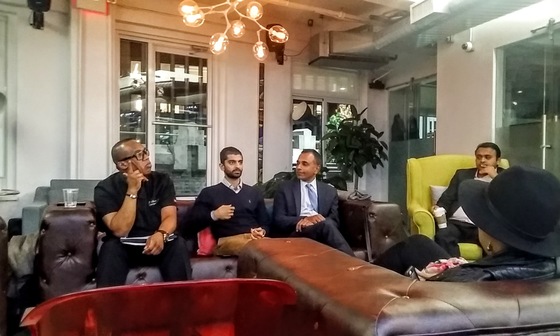Healthcare Technology Offers Opportunities if You Can Cure Pain Points
NEW YORK—Opportunities abound in healthcare technology, but many challenges prevail. It takes its sweet time to scale. It takes some pivoting to reach product-market fit. It’s better narrowed down to a particular category than spread out. And perhaps the most challenging of all, it’s tightly regulated that every time a healthcare specialist or entrepreneur opens his mouth, you hear HIPAA compliance all the time. HIPAA is the Health Insurance Portability and Accountability Act, which requires protection and confidential handling of personal information, among others.
At Workville last October 11, Jason Malki’s Alley Boost meetup assembled a great panel of startups in the health space to talk about health technology. The guest speakers were Ram Swaminathan, founder and CEO of Buddi Health, a startup innovating on a disruptive deep learning platform focused on the US healthcare revenue cycle space; physician Atul Kumar, mentor and angel investor for healthcare IT startups; physician Philip Christian, DreamIt Ventures managing director for health; and Samir Malik, SVP/general manager of Genoa Telepsychiatry.
Many healthcare technology startups are looking for automated and interoperable healthcare information solutions to improve medical care, lower costs, increase efficiency, reduce error and improve patient satisfaction while also optimizing reimbursement for ambulatory and inpatient healthcare providers.
Other than the tight regulations in this vertical, the panel thinks many health tech startups have not pinned down this one thing: the pain point they are addressing.
On core pointers when launching a startup
Christian: Ask yourself how big the problem is; every good idea does not turn into a business
Malik: (Startups rely) bias-to-action (thinking). Listen to the market, interact with the market, talk to them. Healthcare moves in cycles that Snapchats don’t. It takes a lot of time.
Kumar: Think of what status quo (is doing). What is existing paradigm? Think of the workflow. Starting point (for learning) has to be with providers
Swaminathan: (Be aware it is) compliance-heavy. Do your market research. Who’s going to pay—payer, provider or patient? Study why other startups fail. Look at sales cycles.
Why healthcare industry is slow to change?
Christian: A physician will ask himself, why he is risking himself and the patient (for a new health technology). Onboarding is real headache
Malik: Decision-making is not as liquid
Kumar: Healthcare is highly regulated but (people know) it’s where opportunities are.
Swaminathan: Policy changes may take 10 years. Liability for a provider is so high. Liability and regulation stifle innovation. You have to win over lots of people, so many decision makers. It probably takes 2 years to get into an agreement, not 8 months.
What are the best ways of cutting sales cycle?
Christian: You have to understand your customer in and out.
Malik: (Develop) personal relationships, spending time with (potential clients), do cold calls, send them articles, listen to their (concerns) as we did for more than 8 months (at one point)
Swamanithan: Pivot a problem before you sell. Keep pivoting until your startup/service becomes a good product-market it. Linkedin works; reach out to physicians there.
How can startups stand out?
Christian: There are lots of copycats, 8 to 15 companies (may have the same platforms). They don’t have bad ideas, they’re just redundant. Make sure your (personal) story connects to your startup. Be realistic where the market is now.
Malik: Turn things into actionable data. Incorporate machine learning
Kumar: Differentiation is so critical. Success lies in metrics. Look into case studies—before and after.
What are exciting emerging trends?
Christian: Technologies that can manage costs
Swamanithan: Locking up data sets, how algorithms can crack the code, how to better assess risks. Reach out to Google and Microsoft (for partnerships)
